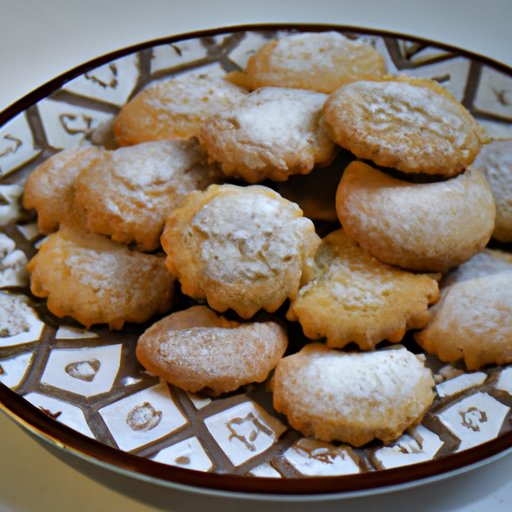
Introduction
There’s nothing quite like a warm, flaky biscuit fresh from the oven. Homemade biscuits are a staple in many households, and for good reason. They’re easy to make, versatile, and taste much better than store-bought biscuits. In this article, we will go through the step-by-step process of making homemade biscuits, offer different variations, share the history of biscuits, and provide tips and tricks for making the best biscuits. Let’s get started!
Step-by-Step Recipe
Here’s what you’ll need to make homemade biscuits:
- 2 cups all-purpose flour
- 1 tablespoon baking powder
- 1/2 teaspoon salt
- 1/2 cup cold unsalted butter, cut into small cubes
- 3/4 cup milk
Instructions:
- Preheat your oven to 425 degrees F (218 degrees C). Line a baking sheet with parchment paper.
- In a large mixing bowl, whisk together the flour, baking powder, and salt.
- Add the cubed butter to the dry ingredients. Using a pastry cutter, fork, or your fingers, cut the butter into the flour mixture until it resembles coarse meal.
- Gently mix in the milk until the dough starts to come together and form into a ball.
- Turn the dough out onto a floured surface and knead it gently for a minute or two until it’s smooth and cohesive.
- Use a rolling pin to roll the dough to about 1/2 inch thickness. Use a biscuit cutter or a glass to cut the dough into rounds.
- Place the dough rounds onto the prepared baking sheet and bake them for about 12-15 minutes or until golden brown.
Tips:
- Make sure to use cold butter straight from the fridge. The cold butter will create pockets of steam as it melts in the oven, resulting in flaky biscuits.
- If you don’t have a biscuit cutter, you can use a glass with a smooth edge to cut the dough into rounds.
- You can brush the tops of the biscuits with melted butter before baking for a richer flavor.
Video Tutorial
For a visual guide, here’s a video tutorial on how to make homemade biscuits:
Notice how she handles the dough with care and gently kneads it. She also uses a fork to blend the cold butter with the flour mixture. These techniques will ensure that your biscuits are fluffy and tender.
Variations to the Basic Biscuit Recipe
If you want to jazz up your basic biscuit recipe, here are a few variations to try:
- Cheese biscuits: Add 1 cup of shredded cheddar cheese to the dry ingredients, and mix until combined. You can also sprinkle extra cheese on top before baking for a crispy cheese crust.
- Jalapeno biscuits: Add 1-2 diced jalapenos (seeds removed) to the dry ingredients for a spicy kick. You can also mix in some shredded cheddar cheese to make jalapeno cheese biscuits.
- Garlic biscuits: Add 1-2 minced garlic cloves to the dry ingredients. You can also brush the tops of the biscuits with garlic butter before baking for an extra dose of garlic flavor.
- Buttermilk biscuits: Substitute the milk in the recipe with buttermilk for tangier biscuits.
Experiment with different flavors and ingredients to make your own unique biscuits. The possibilities are endless!
History of Biscuits
Biscuits have a long history dating back to ancient times. The word “biscuit” comes from the Latin words “bis” (twice) and “coquere” (to cook), meaning “twice-cooked.” Biscuits were originally made as a way to preserve food by baking it twice to remove all moisture.
Over time, biscuits evolved into a popular food item in many cultures, including Europe, Asia, and the Americas. In the United States, biscuits became a staple food during the Civil War, when soldiers used them for sustenance on the battlefield. Today, biscuits remain a beloved comfort food that can be enjoyed on their own or as a side dish to savory meals.
Tips and Tricks
Here are a few tips and tricks for making the perfect biscuits:
- Use cold butter and milk. Cold ingredients will help create steam pockets in the dough, resulting in a flaky texture.
- Use a pastry cutter or fork to mix the butter into the flour mixture. You want to avoid overworking the dough, as this can result in tough biscuits.
- Handle the dough gently. Too much kneading can make the biscuits tough, so only knead as much as necessary.
- Measure your ingredients accurately. Baking is a science, and even small deviations from the recipe can affect the outcome.
- Don’t twist the biscuit cutter when cutting the dough rounds. Twisting can seal the edges and prevent the biscuits from rising properly.
- For even baking, rotate the baking sheet halfway through the baking time.
Biscuit Accompaniments
Once your biscuits are baked, you can enjoy them in a variety of ways. Here are a few suggestions:
- Serve with butter and honey or jam for a sweet breakfast treat.
- Serve as a side dish to savory meals, such as fried chicken or pot roast.
- Make biscuits and gravy by topping warm biscuits with a creamy sausage gravy.
- Use leftover biscuits to make breakfast sandwiches or mini pizzas.
If you have leftover biscuits, store them in an airtight container at room temperature for up to two days. To reheat, wrap them in foil and bake in a 350-degree F (175-degree C) oven for about 10 minutes.
Conclusion
Homemade biscuits are a delicious and versatile food item that can be enjoyed in many ways. By following our step-by-step recipe and experimenting with different variations, you can make biscuits that are perfectly fluffy and flavorful. Remember to handle the dough gently, measure your ingredients accurately, and don’t be afraid to get creative! Share your biscuit-making experiences and tips in the comments below.




